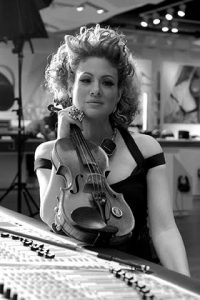By Ted Christodulidis / Photos by Noam Galai
As Plato declared: “Music is a moral law. It gives soul to the universe, wings to the mind, flight to the imagination, and charm and gaiety to life and to everything.” Music is widely recognized as one of the most influential art forms, having the power to transcend both geographical and cultural boundaries. Grammy-winning violinist Miri Ben-Ari’s career is a perfect example of this transcendence. Having collaborated with artists such as Jay-Z, Kanye West, Alicia Keys, John Legend, Patti LaBelle, Wu-Tang Clan and Armin van Buuren, her masterful merging of genres is what has ultimately landed her the success and recognition she has today. Ben-Ari recently set time aside to speak with VUE about her experience and influence with music.

Ben-Ari first picked up a violin at the age of five, but to anyone who’s casually picked up an instrument, it’s clear that at just five years old, it’s virtually impossible to simply become a master. “Frankly, I really don’t remember,” she said about her beginnings. “At the age of five, however, you’re not really choosing the violin; it really has to come from the parents. I was fortunate enough that my parents introduced me so young, and I guess I liked it. It was a long road with a lot of work,” Ben-Ari stated. “I was just a young hopeful attending the Jerusalem Music Academy, founded by classical violinist and composer, Isaac Stern. After a few master classes with him, he recommended that the foundation gift me a violin of my own.” To this day, Ben-Ari still cherishes that violin, considering it a priceless keepsake.
Ben-Ari revealed that “most importantly, it’s what you do with the gift. When you’re introduced to any instrument at an early age, it develops the brain in incredible ways.” She spoke of a friend, Dr. Charles Limb from San Francisco, who is a surgeon, neuroscientist, and musician at the University of California and has carried out research on topics ranging from the neural basis of musical creativity, to the impact of cochlear implants in hearing-impaired individuals in regards to musical perception. Using fMRI, he’s focused on the imaging of the brain of jazz musicians as they improvise. He believes that improvisation is imperative to creativity, but more so that creativity is vital to problem-solving, evolution, and simply to survive. “I follow this area of study very closely,” Ben-Ari said. “I believe that there’s a lot to be explored, and it’s going to affect everyone when we uncover the mysteries of this particular area of the brain.”
Her move to New York proved to be a turning point in her life, affirming that she “was always a little gypsy, moving all over.” She explained: “I came to the states at 15, after winning a competition. This was one of the first times I realized that music had the ability to transcend geographical borders.” At 18, she returned to Israel to serve her compulsory military service, but quickly returned to New York after completing the service. “I really grew up in what I call a ‘classical bubble;’ in my house, there were a few classical radio stations that would play. Maybe the occasional Pink Floyd or Beatles, but a heavy focus on classical,” Ben-Ari recalled. “I remember hearing Marvin Gaye for the first time and just thinking ‘wow;’ it was really mind-blowing. The soulfulness of that music is what pushed me to make the move,” recalling that it was up to her to discover modern music styles. Considering that more modern genres like hip-hop were still in their infancy and some 5,700 miles away when Ben-Ari was born, New York’s music culture would serve as a gateway for her to create her own unique sound.
Thereafter, she received a scholarship from The New School to study within the jazz department. “I didn’t have money to pay tuition, so I was taking small gigs to make payments. They ended up failing me due to attendance, and once I failed music, they revoked my scholarship.” She was fast to mention, however, that she quickly got her “swift revenge” against the school that failed her by winning a Grammy for her work on Kanye West’s The College Dropout, the irony of which is, well, more than obvious. “I really can’t imagine professors failing students for lack of attendance,” she added. “I understand the need for rules, but if you’re a teacher, you need to see beyond that and evaluate the potential, the enthusiasm and the willingness of students.”
 After receiving her Grammy in 2005, both her career and personal image were quickly elevated to that of celebrity-status. After humbly recognizing her situation, Ben-Ari founded (and still heads) a nonprofit called ‘Gedenk’ (meaning “commemorate” or “memorialize” in German), an organization which promotes acceptance and tolerance to today’s youth. “We have a responsibility to educate the next generation,” she told me. “Acceptance and tolerance aren’t simply inherited, they must be taught. If we don’t teach this [to the next generation], we’re bound to repeat past mistakes. My life’s mission right now is to use music to heal.”
After receiving her Grammy in 2005, both her career and personal image were quickly elevated to that of celebrity-status. After humbly recognizing her situation, Ben-Ari founded (and still heads) a nonprofit called ‘Gedenk’ (meaning “commemorate” or “memorialize” in German), an organization which promotes acceptance and tolerance to today’s youth. “We have a responsibility to educate the next generation,” she told me. “Acceptance and tolerance aren’t simply inherited, they must be taught. If we don’t teach this [to the next generation], we’re bound to repeat past mistakes. My life’s mission right now is to use music to heal.”
Gedenk’s latest program, rightly titled “50 States of Tolerance,” plans to visit 50 schools in 50 states during the 2016-2017 academic year in order to reach a minimum of 150,000 students using live performances, multimedia, and interactive educational programs. “It’s a lot of work, but also very fulfilling. So far, we’ve tested the performances with students and have gotten really positive feedback,” Ben-Ari explained. Her latest song, titled “Freedom” and featuring the late Nelson Mandela, are also part of the 50 States program. “It’s another example of how music can carry a message,” Ben-Ari said. “Every time you listen to the speech, you’re hearing this message from a legend, an icon of freedom and you realize just how timeless it is. It doesn’t matter what time period you’re listening to it in, it’s always relevant.” Ben-Ari went on to add that: “One of my favorite songs I’ve produced, though, is ‘Symphony of Brotherhood’ featuring Dr. Martin Luther King Jr. This song got me around the world, got me invited to the White House, and even got me an honor from former Israeli President Shimon Peres. It made history in a lot of areas, even becoming a key part of a Viacom ad. But for me, frankly, the most amazing honor is the response I’ve received from the young people. Having them tell me how they’re touched, and playing along with the song, it means everything to me.”
More recently, Ben-Ari moved just up the street from Edgewater to Fort Lee. “Something like five minutes from my old house?” she added. “Fort Lee is really something else compared to Edgewater; from the unique demographic, all of the new developments springing up.” She likes to refer to this whole area (including Hoboken) as “a little New York. We’re so close to the city, and yet you don’t have the traffic, the noise, and you can actually see the sky!” She stated that, however, she does still spend quite the time in Edgewater, whether she’s relaxing at her favorite café, Kuppi Coffee, or having a twirl on the waterfront Hudson Dance Studio. “It’s a really great area, and we truly couldn’t be happier about the decision to move here.”
The post Miri Ben-Ari: Beyond the Boundaries of Music appeared first on VUE magazine.
